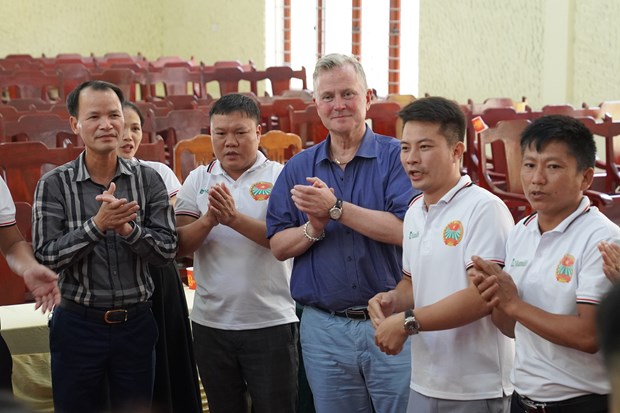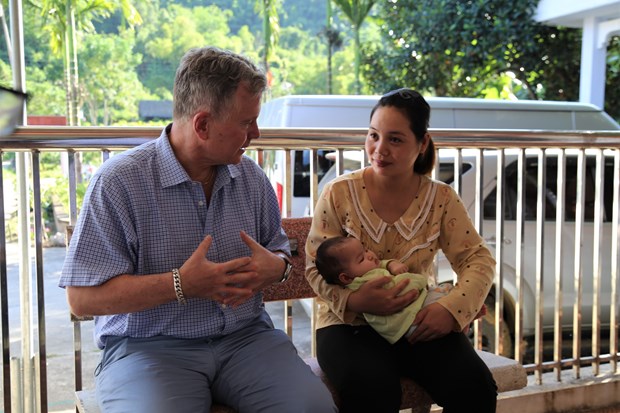📝 OP-ED: UNFPA harnessing digital innovations, technology to promote gender equality

Hanoi (VNA) - UNFPA's Regional Director for Asia and the Pacific Björn Andersson has written an article titled “Harnessing digital innovations and technology to advance women’s and girls’ sexual and reproductive health and rights,” on the occasion of International Women’s Day – March 8.
 UNFPA's Regional Director for Asia and the Pacific Björn Andersson. (Photo courtesy of UNFPA)
UNFPA's Regional Director for Asia and the Pacific Björn Andersson. (Photo courtesy of UNFPA)The following is the full text of the article.
“Innovation and technology have the potential to empower women and girls and help realize their sexual and reproductive health and rights. Mobile phones and the internet are part of daily life for many people in the Asia-Pacific region, and women and girls are increasingly using digital platforms to share and access information on sexual and reproductive health, including menstrual health, family planning, and comprehensive sexuality education. Civil society organizations in the region are also actively promoting their campaigns online, challenging traditional norms around gender and sexuality, and using the power of social media to reach further and farther.
The importance of digital innovation and technology is ever more paramount in the age of complex global mega crises, such as the COVID-19 pandemic and the climate crisis, which have exacerbated existing inequalities. Disasters such as typhoons, floods and droughts are increasing in frequency and intensity in many parts of the Asia-Pacific region, with devastating implications on sexual and reproductive health. Such crises disrupt access to essential and life-saving health services, including maternal health care, and increase vulnerability to gender-based violence as women and girls become displaced.
 UNFPA's Regional Director for Asia and the Pacific Björn Andersson and members of the responsible fatherhood club in Vietnam's Bac Giang province. (Photo courtesy of UNFPA)
UNFPA's Regional Director for Asia and the Pacific Björn Andersson and members of the responsible fatherhood club in Vietnam's Bac Giang province. (Photo courtesy of UNFPA)COVID-19 has also adversely affected essential health services, including sexual and reproductive health services, and has led to a significant increase in gender-based violence and vulnerability to harmful practices. It is estimated that as many as 1.4 million unintended pregnancies occurred due to disruptions in contraceptive supplies and services in the first 12 months of the pandemic. But the global crisis also taught us how to overcome distance and movement restrictions, including through telemedicine, easier access to medical prescriptions and the creation of digital platforms to address violence against women and girls.
So, how can we accelerate progress for women and girls, deliver quality sexual and reproductive health services, bring an end to preventable maternal deaths, address harmful gender norms and end gender-based violence, and achieve overall gender equality, through introducing and scaling up the use of technology and digital innovations?
UNFPA is increasingly investing in innovative methods and digital initiatives, such as virtual reality experiences, mobile apps, and telephony-based edutainment channels, across the Asia-Pacific region.
During my recent visit to India, I experienced first-hand UNFPA’s training module for midwives using virtual reality simulation. This initiative - once rolled out - has the potential to provide training to midwives on labour and complications management. Upon receiving this experiential learning, I am hopeful that their clinical skills will be strengthened, enabling them to save the lives of mothers and newborns.
Young people in Indonesia are increasingly accessing sexual and reproductive health information and services through digital platforms, facilitated by its low-cost and anonymous nature. UNFPA is building a national network of youth content creators, including influencers and youth-led civil society organizations, to engage young people through safe, quality, and fun digital spaces offering information to a large young audience.
 UNFPA's Regional Director for Asia and the Pacific Björn Andersson in a visit to Vietnam's northern mountainous province of Bac Kan. (Photo courtesy of UNFPA)
UNFPA's Regional Director for Asia and the Pacific Björn Andersson in a visit to Vietnam's northern mountainous province of Bac Kan. (Photo courtesy of UNFPA)In Myanmar, UNFPA partnered with an educational technology company, 360ed, to develop the ‘Baykin 2.0’ app which uses augmented reality to improve access to accurate information on sexual and reproductive health and rights, and gender-based violence for adolescents and youth.
Needless to say, women and girls must be at the centre of designing and developing creative and innovative solutions that bring us closer to an equal future for all. But the one significant challenge in promoting gender equality through digital innovation and technology is ensuring that all women and girls, including in rural areas and marginalized communities, have access to and are equipped with the necessary literacy, skills and resources. According to the Mobile Gender Gap Report by GSMA, women are 16% less likely than men to use mobile internet in low- and middle-income countries, and the gender gap in mobile phone ownership is 19% in South Asia.
Supporting women and girls impacted by the digital divide must be a priority for governments and partners as countries build back better in a post-pandemic world. Promoting women's digital literacy and Science, Technology, Engineering, and Mathematics (STEM) education and careers, as well as leveraging financing for inclusive digital development can substantially support women's economic and social empowerment.
Only when women and girls are at the forefront of accessing, benefiting from and applying technology, can we bring about truly gender-transformative technological solutions.
Let us all work together to bridge the digital gender divide and harness the power of technology and digital innovations to advance women’s and girls’ rights, including their reproductive rights./.
|
UNFPA is proud to support the Directorate of Vocational Education and Training under the Ministry of Labour, Invalid and Social Affairs to develop a comprehensive sexuality education for students at vocational education and training facilities in Vietnam: giaoducgioitinh.online. It is composed of 50 sessions, providing information and knowledge on sexual and reproductive health, HIV/AIDS, sexually transmitted infection and gender equality. UNFPA also works with Ministry of Health to develop a smartphone application called Happy and Healthy Mother and Child (“MCH247”) with financial support from the Government of Japan. Through this app, Vietnamese mothers especially ethnic minorities living in rural and remote provinces can now access information and services on sexual and reproductive health from wherever they are. Women can manage their sexual and reproductive health including pregnancy and childbirth, monitor the physical development of their children as well as vaccination schedules with this app. |












